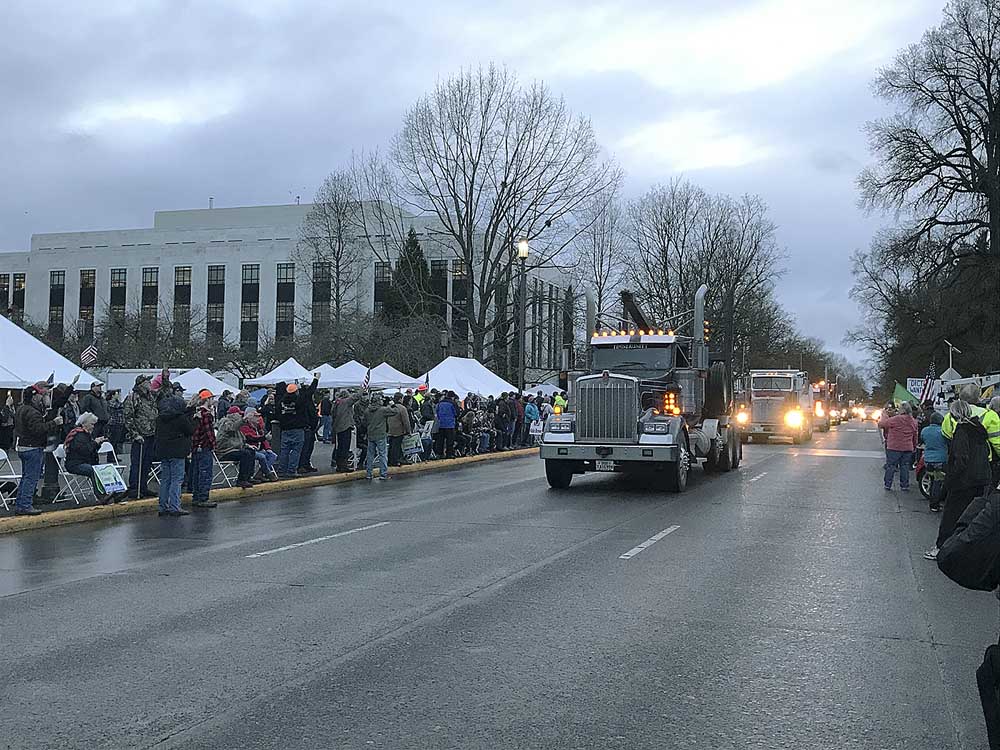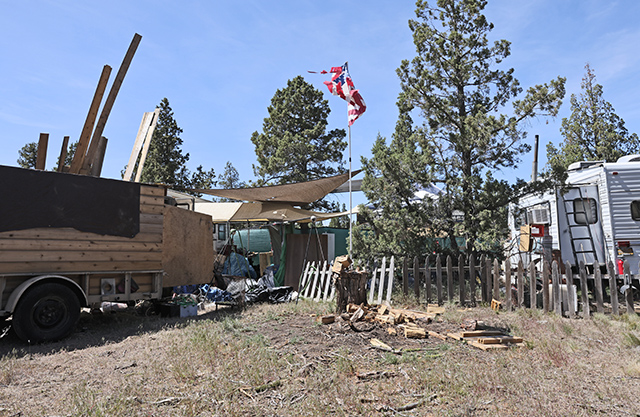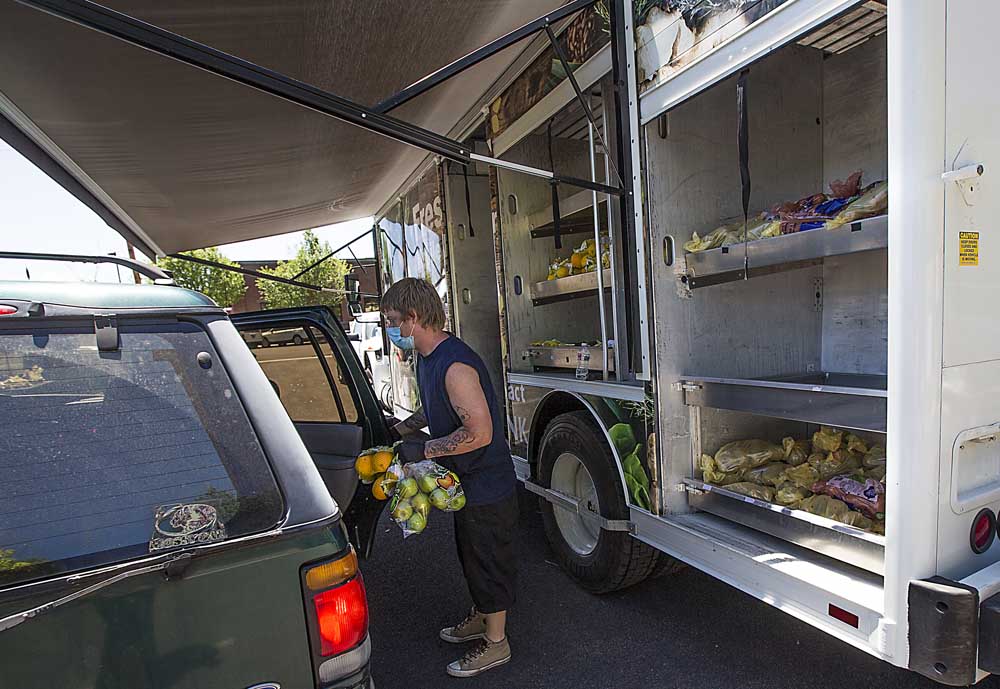Cap-and-trade bill remains divisive in Central Oregon
Published 4:30 pm Thursday, February 13, 2020

- Timber Unity supporters greet the convoy of trucks as it arrives Thursday, Feb. 6, 2020 at the Oregon Capitol. Traffic on Interstate 5 was backed up as the big rigs arrived in Salem from all directions.
As Oregon’s divisive cap-and-trade bill moves through committees in the halls of state government, business, political and tribal leaders in Central Oregon are lining up to have their opinions heard.
The bill, which seeks to curb greenhouse gases, could impact rural Oregonians the most, according to Crook County Judge Seth Crawford, who traveled to Salem a week ago to speak at the state Legislature.
“This bill will accomplish very little in terms of world climate,” said Crawford in comments to Oregon’s lawmakers. “I am deeply concerned that it will devastate the community I live in.”
Crawford is taking a position against Senate Bill 1530, which seeks to cap and shrink Oregon’s carbon emissions while generating revenue for environmental projects.
The bill would force large polluters in manufacturing, transportation and the utilities to obtain credits for the carbon they emit. But Crawford says the bill will increase costs for small businesses and cost jobs in the agricultural sector.
Crawford represents Crook County, a largely rural community with an economy based on forest products, agriculture and livestock. Les Schwab Tire Centers is the county’s largest employer, supporting 400 jobs, but many also raise livestock and crops. Crawford said the use of older technology, which may emit more carbon, is typical in rural Oregon, but people in these areas should be not punished for using secondhand or outdated equipment.
“This bill is not about our common future or even about our Oregon,” Crawford said, addressing Gov. Kate Brown, Speaker Tina Kotek and President of the Senate, Peter Courtney on Feb. 5. “It is about your failure to envision a future that is fair and equitable for all Oregonians.”
The increasing cost of diesel fuel will make operating less-efficient equipment unprofitable, said Crawford, because users of older equipment will need to either upgrade or go out of business. Cap and trade will throw up barriers to those looking to purchase older equipment for their businesses, he said.
“What you are doing is killing the middle class in rural Oregon,” said Crawford, who was elected judge in 2016. “The only people that will be able to afford to start new businesses with new equipment are the people that already have wealth.”
On Tuesday, around 1,000 supporters of the bill rallied in front of the Oregon State Capitol. The event was organized by the environmental group Renew Oregon.
That rally followed one protesting the bill a week ago, organized by the rural advocacy group Timber Unity. Loggers, farmers and truckers descended on Salem in a convoy of semis from cities around the state to denounce the bill.
Deschutes County Commissioner Tony DeBone joined Timber Unity in protesting the bill. DeBone said he and the two other country commissioners, Patti Adair and Phil Henderson, are united in their opposition to the bill.
“We shouldn’t villainize the heavy equipment that runs on diesel,” said DeBone. “Transportation is the major contributor to CO2 emissions in Oregon, especially in metro areas. It’s one thing to say we are going to put a tax for the environment but it does not seem like it’s being done equitably.”
Roger Lee, the chief executive officer for Economic Development for Central Oregon, a nonprofit group, said the program will increase state gas taxes by $0.22 per gallon in the first year on top of the $0.36 per gallon Oregonians pay now. The costs will negatively impact companies transporting both raw materials and finished goods, said Lee.
“We believe that policy changes that put our farmers, manufacturers, trucking companies and other businesses at risk on an unlevel playing field with their competitors elsewhere is simply not good policy,” said Lee.
Henderson, one of the three Deschutes County commissioners, points out that confusion may occur in Central Oregon due to recent amendments to the bill that affect Bend, but exempts areas outside the city from certain regulations. The changes could also affect Portland and Western Oregon differently, which will increase costs for Central Oregonians traveling to other parts of the state.
“What dislocations will that create?” said Henderson. “Let other states take the lead.”
While the threat of job losses and rising fuel costs are sparking fears in rural communities, others say cap and trade can be a job creator and will lower monthly utility bills through energy savings. Cap and trade can also decrease medical bills through improved air quality, especially on transportation corridors.
David Roland-Holst, a University of California, Berkeley economist, reports that Oregon’s cap-and-trade bill could create 50,000 jobs over 30 years through the promotion of technology innovation. He adds that Oregon’s gross domestic product will rise by more than 2.5% by 2050 if the policies are implemented.
The program has a goal of slashing emissions to 45% below 1990 levels by 2035 and 80% below 1990 levels by the year 2050. Revenue generated from the bill will be pumped into environmental projects, including energy efficiency projects for utilities.
Keith Wilson, president of Titan Freight Systems, which has a terminal in Bend, said he is looking forward to a future of trucking freight to Central Oregon in electric-powered trucks. While the trucks are not yet available, he already uses electric forklifts in his warehouses and is sold on the costs savings, explaining that his fuel costs are down by 60%.
“Our job is to operate with the lowest cost equipment,” said Wilson. “I see nothing but silver lining through the process.”
While fuel costs can help, others say a cap-and-trade bill is good for Oregon because it seeks to protect snowpack and winter weather that supports tourism in the Cascades.
“There are lots of jobs at stake if the climate continues to warm, including tourism and Mt. Bachelor,” said Brad Reed, a spokesman for the environmental group Renew Oregon. “Drought can devastate rural communities for generations to come.”
Reed points to California as an example of a state that has already adopted a cap-and-trade program with success.
“They are eight years into their program and agricultural communities haven’t seen negative impacts,” Reed said. “There have been technological innovations and state programs are paying for farmers to use new equipment.”
The argument that fighting climate change is a moral imperative should not be lost in the debates over costs and the economy, said Carina Miller, a member of the Confederated Tribes of Warm Springs.
“We recognize that there is a need to do something immediately as we have been witnessing seasons shift, with impacts on our wildlife, rivers and forests,” said Miller, who served three years on the Warm Springs Tribal Council.
Miller also remains hopeful that cap and trade will not only help the environment but also boost the economy. She has been involved in the development of the bill and said its authors put strong consideration toward limiting the impact gasoline prices rises can have on rural Oregonians, and she sees direct benefits for tribal members.
“I am not concerned that (the bill) will hurt job opportunities for tribal members,” said Miller. “Revenue generated by carbon markets projects will be used to strengthen our local economy and provide more stable funding that better aligns with our tribal values.”






